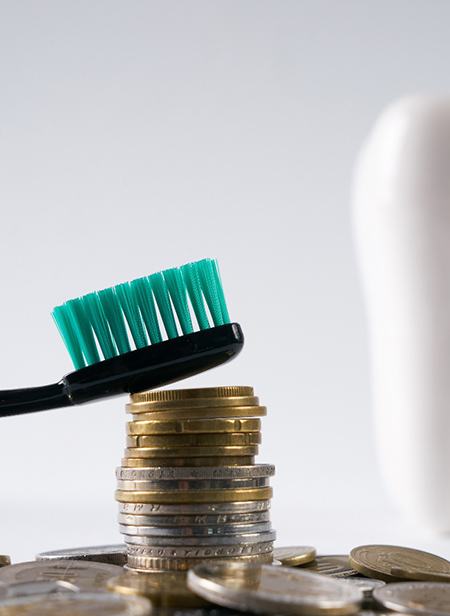
Dental Crowns – Manchester, NH
Beautiful Restorations for Damaged Teeth
Tooth enamel doesn’t contain any living cells, so it can’t heal itself the way that your bones can. So if a tooth becomes damaged, the problem won’t go away on its own. The good news, though, is that Dr. Golparvar can restore the tooth in question with a personalized crown, keeping it safe from further harm while also restoring its ability to function normally. If you think you might need to have a dental crown placed, contact us today.
Why Choose Webster Dental Associates of Manchester for Dental Crowns?
- CEREC Same-Day Crowns Available
- Lifelike All-Ceramic Restorations
- Experienced Dental Expert
What is a Dental Crown?

A dental crown is a tooth-shaped cap that can be used to address all kinds of oral health issues. Our team can attach a crown to a tooth that has been significantly damaged or weakened, thus protecting and strengthening it.
The dental crowns provided at Webster Dental Associates of Manchester are made from all ceramic materials. This makes them both durable and natural-looking; you will be able to show off your smile with confidence without having to worry about people noticing your dental work.
One thing that’s notable about dental crowns is that they can be used in many different situations. You may be eligible for a crown if:
- You have a badly decayed tooth.
- You have a fractured tooth.
- You have just had a root canal treatment performed.
- You are getting a dental bridge. (Two crowns can anchor the bridge to your natural teeth.)
- You are replacing a single tooth with a dental implant.
The Dental Crown Process

The traditional process of getting a dental crown normally takes two visits. The first appointment involves preparing the tooth and taking impressions. A separate dental lab makes the crown, which can take two to three weeks; during that time, the patient wears a temporary crown to keep their tooth safe. The second appointment is when the permanent crown is placed.
However, at our office, we can provide one-visit crowns thanks to our state-of-the-art CEREC system. After digital impressions have been taken, the final crown will be made right here in our office by a milling machine. Once it’s ready, we can simply place it on your tooth. Thanks to CEREC, you can avoid the stress of scheduling multiple appointments to get a crown, and you won’t have to worry about wearing a temporary restoration.
The Benefits of Getting a Dental Crown

One of the most important benefits of a dental crown is the protection that it offers; covering a tooth with a crown can go a long way toward reducing the need for more extensive treatments later. On top of that, getting a crown made out of tooth-colored materials can help improve the appearance of your smile.
Another key advantage of dental crowns is the longevity that they offer. If you practice good oral hygiene habits every day and avoid bad habits such as biting your nails, you can often expect to get anywhere from 5 to 15 years of use out of your crown.
Understanding the Cost of Dental Crowns

Dental crowns are a powerful, versatile option to repair the teeth, capable of dealing with a variety of different issues. The procedure is as unique as the patients it can serve, and while this makes the treatment incredibly effective, it also adds a lot of variables that affect the cost of the procedure.
If you’re attempting to budget for an upcoming dental crown procedure, we’ll give you a complete estimate for the cost of the treatment when we meet you in person. Before then, here’s what you should know about what dental crowns could cost you.
Learn MoreFactors that Affect the Cost of Dental Crowns

If you’re looking to properly budget for your dental crown procedure, it’s important to think a little bit about what factors could influence the price of the restoration. The first, of course, is what kind of procedure that will precede your dental crown. For example, root canals will add to the cost of your treatment.
Then there’s the price of the dental crown itself, which has to do with the type of tooth you’re treating, the material used for the crown, and how the crown is constructed. We’ll help you make these decisions when we meet you in person, balancing your needs with what you’re willing to pay.
Does Dental Insurance Cover Dental Crowns?

When dental crowns are used to treat medical issues, they are typically covered by insurance. Depending on the nature of your dental plan, you can often expect to have around 50% of your crown paid for. Of course, this depends a lot on the nature of your unique insurance company, so we’ll help you consult with them to ensure that you get the most out of your benefits.
Other Options for Making Dental Crowns Affordable

If you don’t have insurance, that doesn’t mean that you have forgo the dental care that you need. We want the services that we provide to our patients to be as affordable as possible, so we’ll be happy to discuss with you all the financial options that are at your disposal.
You may be interested in financing, which can allow you to front the cost of your dental care and pay it off later. CareCredit and Lending Point are two financing firms we have a good relationship with; if you’re interested in these services, give us a call and we’ll be happy to discuss them with you.
Dental Crowns FAQs
Are Dental Crowns Permanent?
While dental crowns are not permanent, they are a long-term solution that can last up to fifteen years with proper care. It’s also important to note that treating a tooth so it can receive a dental crown is irreversible, so it will need to wear one for protection from then on. However, wearing a dental crown can prevent further injury or infection to the tooth, helping it to last much longer than it would have otherwise. Some great ways to help your crown last for as long as possible include practicing excellent oral hygiene, seeing your dentist regularly, and wearing a mouthguard when playing sports or if you grind your teeth in your sleep.
How Do You Know When a Dental Crown Needs to Be Replaced?
While only a qualified dentist can make the final call as to whether your crown needs replacement, there are a few signs you may notice if your crown is nearing the end of its days. A few of these include:
- Pain: You may experience pain if the tooth wearing the crown becomes infected. If this happens, the crown will need to be removed so the decay can be treated. Dr. Golparvar will then determine whether the crown can be reattached to the tooth or if it should be replaced altogether.
- Instability: If your crown feels loose, especially when chewing on sticky foods, contact your dentist for assistance.
- Diminished appearance: A chipped or discolored crown can make a patient shy about showing their smile, making replacement a reasonable course of action.
- A dark line showing at the base: If you have a porcelain-fused-to-metal crown, a dark line at the base can mean that the porcelain part is wearing away or separating from the metal base underneath. This visible wear means that the crown might need replacing soon.
Does Getting a Dental Crown Hurt?
Dental crowns protect teeth from infection and injury, meaning wearing one can spare a tooth from pain later on. Before preparing your tooth to receive a dental crown, Dr. Golparvar will use a local anesthetic to render the process completely painless. While crowns are traditionally placed over at least two appointments, our office offers CEREC same-day dental crowns that can be placed in a single visit. Once your crown has been placed, you may experience some sensitivity in the tooth for a few days, especially if the crown was needed because of a root canal. Over-the-counter pain medication should help with any discomfort, but contact your dentist if your discomfort gets worse.
Do Dental Crowns Feel Natural?
After receiving a dental crown, your tooth may feel strange for a few days, but it should feel more and more natural as you acclimate to wearing it. Dr. Golparvar reshapes teeth receiving crowns so they can wear them comfortably, and crowns are designed using high-quality impressions of your teeth, allowing them to be customized to fit perfectly. Dental crowns are made from strong materials that can stand up to the pressures of everyday chewing, so eating with one shouldn’t feel strange after getting used to it. You may find that a crown feels slightly different against your tongue than your other teeth, but other than that it should feel completely natural and practically unnoticeable.